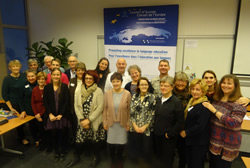On 1st and 2nd December 2016 the ECML hosted its second “Think tank”, bringing together language experts from ECML member states, from other European countries and from Canada, who, together with the ECML secretariat, pooled their ideas and expertise to address one of the most important area of language education: early language learning. The overall aim of the Think tank was to present the ECML with recommendations on the kinds of activities the Centre could undertake in this area, within its current programme 2016-19.
The two-day event was preceded with an online questionnaire – one which triggered a very positive response from across the world. 153 completed responses from 31 different countries were received, with strongest interest from Switzerland, Romania and Greece. There was a wide array of respondent profiles including parents, pre-school and primary teachers, specialist language teachers, teacher trainers, head teachers and researchers, data which helped the ECML secretariat and the think tank moderation team identify the key challenges as well as examples of innovative practice and to use these as a basis for discussion at the think tank itself.
In addition to the questionnaire data, participants were presented with an overview of European policy on early language learning and of ECML existing resources in this area. They were also inspired by the presentation of one Irish primary school’s response to linguistic diversity and witnessed the positive learning outcomes and strong self-esteem experienced by these young learners whose languages and cultures were valued and drawn upon as a rich resource for learning. There was a wide array of respondent profiles including parents, pre-school and primary teachers, specialist language teachers, teacher trainers, head teachers and researchers, data which helped the ECML secretariat and the think tank moderation team identify the key challenges as well as examples of innovative practice and to use these as a basis for discussion at the think tank itself.
In order to come up with proposals for the ECML, the experts worked in groups to address the following issues:
- The methodologies of language teaching and assessment in primary and pre-primary, including the role of CLIL. Continuity and progression within primary education and transition to secondary education.
- The content of pre- and in-service training and development programmes for teachers and the place of autonomous learning
- Making best use of all of the human resources in and around the school – the wider school community
- Making all the different resources available in an easily accessible and coherent way
A number of very interesting proposals emerged with the main focus being the question of teacher education, both initial and in-service. There was unanimous agreement that any training needed to begin with attitudes and values – with a commitment to plurilingual and intercultural education; to recognising and valuing all of the languages in both the learner and the teacher’s repertoire. Moreover, experts were keen to build on existing ECML tools such as PEPELINO, CARAP, Conbat + and EPOSTL (*) to ensure continuous support for teachers from pre-primary through to secondary and beyond. In the run-up to Christmas the ECML hopes to discuss these ideas with its Bureau so that 2017 can begin with a decision on the way ahead.
The ECML would like to take this opportunity to thank the moderation team and the participants for their hard work, their enthusiasm and their willingness to share their experience and expertise, all in an atmosphere of genuine intercultural enrichment and warm conviviality.
*****
(*)
PEPELINO – European portfolio for pre-primary educators – The plurilingual and intercultural dimension
CARAP – A framework of reference for pluralistic approaches to languages and cultures
Conbat + – Plurilingualism and pluriculturalism in content-based teaching: A training kit
EPOSTL – Using the European portfolio for student teachers of languages
